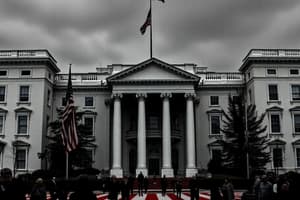Podcast
Questions and Answers
What is defined as a conspiracy?
What is defined as a conspiracy?
- A secret plan by a group to do something unlawful or harmful. (correct)
- An agreement between two parties for a legal transaction.
- A well-known public event.
- A random collection of individuals discussing ideas.
Which scandal involved the Republicans conspiring to break into the Democratic National Committee Headquarters?
Which scandal involved the Republicans conspiring to break into the Democratic National Committee Headquarters?
- Gunpowder Plot
- Moon Landing Hoax
- Watergate Scandal (correct)
- 9/11 Incident
What was the purpose of the Gunpowder Plot?
What was the purpose of the Gunpowder Plot?
- To gain independence from foreign rule.
- To assassinate a political leader to promote Catholicism. (correct)
- To steal documents from Parliament.
- To cover up a government scandal.
Which of the following conspiracy theories claims that the US government was behind the 9/11 attacks?
Which of the following conspiracy theories claims that the US government was behind the 9/11 attacks?
Which conspiracy theory suggests that vaccines are used for population control?
Which conspiracy theory suggests that vaccines are used for population control?
What major historical event is associated with Guy Fawkes and his conspirators?
What major historical event is associated with Guy Fawkes and his conspirators?
What was a key motivation behind the Moon Landing Conspiracy theory?
What was a key motivation behind the Moon Landing Conspiracy theory?
Which conspiracy theory involves individuals claiming that the Holocaust did not occur?
Which conspiracy theory involves individuals claiming that the Holocaust did not occur?
What do conspiracy theorists believe about mainstream accounts of events?
What do conspiracy theorists believe about mainstream accounts of events?
Which description correctly characterizes conspiracy sceptics?
Which description correctly characterizes conspiracy sceptics?
What trait is commonly associated with conspiracy theorists according to psychologists?
What trait is commonly associated with conspiracy theorists according to psychologists?
What do conspiracy theorists typically accuse powerful individuals of?
What do conspiracy theorists typically accuse powerful individuals of?
What common viewpoint do conspiracy theorists have about the events such as the Sandy Hook shooting?
What common viewpoint do conspiracy theorists have about the events such as the Sandy Hook shooting?
How are conspiracy theorists often mischaracterized in social discourse?
How are conspiracy theorists often mischaracterized in social discourse?
What motivates conspiracy theorists according to their critics?
What motivates conspiracy theorists according to their critics?
What can result from the belief in conspiracy theories, as noted by psychologists?
What can result from the belief in conspiracy theories, as noted by psychologists?
What characteristic of conspiracy theories makes them particularly unlikely to be true?
What characteristic of conspiracy theories makes them particularly unlikely to be true?
In what way are conspiracy theories generally viewed in relation to official narratives?
In what way are conspiracy theories generally viewed in relation to official narratives?
What distinguishes Conspiracy Theories from conspiracy theories according to Cassam?
What distinguishes Conspiracy Theories from conspiracy theories according to Cassam?
Which of the following best describes the nature of conspiracy theories?
Which of the following best describes the nature of conspiracy theories?
How do conspiracy theories typically utilize appearances?
How do conspiracy theories typically utilize appearances?
What does Cassam consider to be the function of Conspiracy Theories?
What does Cassam consider to be the function of Conspiracy Theories?
Who tends to support conspiracy theories, despite a lack of relevant expertise?
Who tends to support conspiracy theories, despite a lack of relevant expertise?
In the context of Conspiracy Theories, what does the term 'propaganda' refer to?
In the context of Conspiracy Theories, what does the term 'propaganda' refer to?
What distinguishes conspiracy theories from other forms of speculation?
What distinguishes conspiracy theories from other forms of speculation?
What example does Cassam give to illustrate the propaganda aspect of Conspiracy Theories?
What example does Cassam give to illustrate the propaganda aspect of Conspiracy Theories?
Which of the following best defines Cassam's view on the belief in Conspiracy Theories?
Which of the following best defines Cassam's view on the belief in Conspiracy Theories?
Which feature is NOT typically associated with conspiracy theories?
Which feature is NOT typically associated with conspiracy theories?
Which of the following statements about conspiracy theories is accurate?
Which of the following statements about conspiracy theories is accurate?
What type of political sentiment does holocaust denial propagate, according to Cassam?
What type of political sentiment does holocaust denial propagate, according to Cassam?
How does Cassam describe the explanations provided by Conspiracy Theories?
How does Cassam describe the explanations provided by Conspiracy Theories?
What distinguishes a conspiracy theory from a Conspiracy Theory as it relates to their historical narratives?
What distinguishes a conspiracy theory from a Conspiracy Theory as it relates to their historical narratives?
What distinguishes the pre-modern worldview from the modern worldview in understanding complex events?
What distinguishes the pre-modern worldview from the modern worldview in understanding complex events?
According to Cassam, what is a major reason conspiracy theories spread?
According to Cassam, what is a major reason conspiracy theories spread?
What is a common characteristic of conspiracy theories as described by Cassam?
What is a common characteristic of conspiracy theories as described by Cassam?
What defines a conspiracy as per the provided content?
What defines a conspiracy as per the provided content?
Why might experts choose not to disclose their true beliefs about certain facts according to the content?
Why might experts choose not to disclose their true beliefs about certain facts according to the content?
In the context of conspiracy theories, what is meant by 'connecting the dots'?
In the context of conspiracy theories, what is meant by 'connecting the dots'?
What is a potential reason why conspiracy theorists believe they are exposing lies?
What is a potential reason why conspiracy theorists believe they are exposing lies?
What critical viewpoint does Cassam hold regarding amateur theories of conspiracy?
What critical viewpoint does Cassam hold regarding amateur theories of conspiracy?
Flashcards are hidden until you start studying
Study Notes
Overview of Conspiracy Theories
- A conspiracy involves two or more people plotting together in secret.
- Historical examples include the Gunpowder Plot, Watergate Scandal, and the 9/11 attacks.
Historical Examples of Conspiracies
- Gunpowder Plot: A failed attempt by Guy Fawkes to kill King James I to end Catholic persecution in England.
- Watergate Scandal: In 1972, Republicans, including President Nixon, conspired to break into the Democratic National Committee, leading to a cover-up and Nixon's resignation.
- 9/11 Attacks: Al Qaeda's conspiracy to attack targets in the US, including the World Trade Center and Pentagon.
Controversial Conspiracy Theories
- Moon Landings: Claims the US faked the moon landing in 1969 to win the space race against the USSR.
- 9/11 Truthers: The belief that the US government orchestrated the 9/11 attacks to justify wars in Afghanistan and Iraq.
- Anti-vaxxers: The theory that vaccines are a tool by Bill Gates to sterilize women in Africa and implant tracking devices.
- Holocaust Deniers: Claims that the Holocaust did not occur, suggesting it was a fabrication to gain sympathy for Jewish migration to Israel.
- JFK Assassination: Conspiracy theories suggest a deeper plot involving the "deep state" rather than Lee Harvey Oswald acting alone.
- Sandy Hook Shooting: Beliefs that the shooting was fabricated by Democrats to promote anti-gun laws.
Conspiracy Theorists vs. Conspiracy Skeptics
- Conspiracy Theorists: Often accept controversial conspiracy theories as rational.
- Conspiracy Skeptics: Reject these theories, considering them irrational or misguided.
Criticisms of Conspiracy Theories
- Critics label conspiracy theorists as gullible, paranoid, or irresponsible.
- Psychologists indicate that conspiracy theorists tend to be male, unmarried, less educated, and may have lower socio-economic status and mental health issues.
- Conspiracy theorists often view skeptics as naïve or conservative for not questioning mainstream narratives.
Distinction between Conspiracy Theories and Conspiracy Theories
- Conspiracy theories are generally based on historical events (e.g., Gunpowder Plot).
- Conspiracy Theories are often unverifiable and promote specific political viewpoints (e.g., Holocaust denial).
Purpose of Conspiracy Theories
- Cassam argues that the main function of Conspiracy Theories is propaganda, often promoting extreme political agendas.
- Counter-argument: Some believe these theories expose hidden truths.
Special Features Distinguishing Conspiracy Theories
- Speculative: Based on guesswork rather than solid evidence.
- Contrarian: Typically oppose official narratives and appearances.
- Esoteric: Reject conventional explanations, creating a mystique around the truth.
- Amateur: Propagated by individuals lacking relevant expertise.
- Pre-modern Worldview: Seek deeper meanings in random events rather than accepting "it just happens."
Conclusion on Conspiracy Theories
- Cassam highlights that Conspiracy Theories are unlikely to be true due to their persuasive yet unfounded nature.
- Unearthing them often involves examining their seductive appeal rather than their veracity.
Key Questions for Consideration
- Familiarize with theories discussed in class for deeper understanding.
- Examine psychological perspectives on believers and their implications.
- Analyze Cassam's views on the purpose of Conspiracy Theories using specific examples.
Studying That Suits You
Use AI to generate personalized quizzes and flashcards to suit your learning preferences.




